
The Foundation Group – an innovative and sustainable model
A foundation that takes on so-called perpetual obligations in the context of post-mining must keep its eyes trained on the future. For this reason, innovative and sustainable solutions to global challenges play a crucial role as part of the Foundation Group.
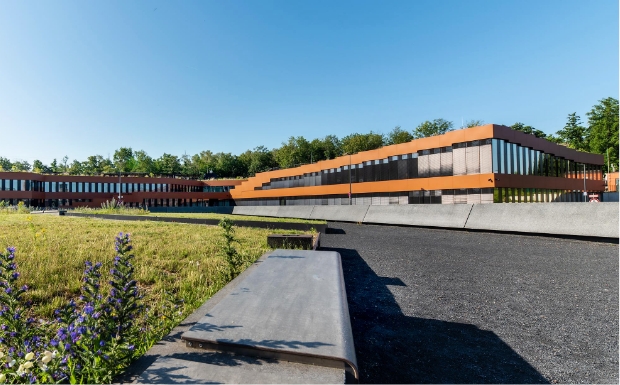
Company headquarters
The RAG-Stiftung is located at the Zollverein UNESCO World Heritage Site. ©Mike Henning
Keeping with the times, anticipating developments and trends and taking account: using this model, the RAG-Stiftung is able to solidly finance the perpetual obligations in line with its mission and to generate yields to this end.
This is why the RAG-Stiftung holds strategic investments in companies whose actions are guided by an orientation towards the future. This includes RAG Aktiengesellschaft on the one hand, which handles the operational implementation of the perpetual obligations on behalf of the RAG-Stiftung as its wholly owned subsidiary.
On the other hand, this also includes Evonik Industries AG, in which the RAG-Stiftung has held a stake since its foundation in 2007. Today, the foundation still owns around 53 per cent of the exchange-listed company. Dividend payments from Evonik make a significant contribution to the financing of the perpetual obligations.
Vivawest GmbH was created in 2012 through a merger of Evonik Immobilien and THS, of which the RAG-Stiftung also owns 58 per cent directly and indirectly, including the shares of RAG Aktiengesellschaft. Finally, the RAG-Stiftung owns 100 per cent of RSBG SE, which considers itself to be a long-term partners to companies in the SME sector.
The RAG-Stiftung generates a part of its regular revenue from income from its investments in the three above-mentioned companies. Three examples from the strategic investments illustrate how the companies have taken a modern and innovative approach to prepare themselves for the challenges of our time.
Evonik Industries AG: Lipids in the fight against the pandemic
The Essen-based company is amongst the world’s leading providers of special chemicals. A major driver of Evonik’s positive developments is its innovative strength. For example, the company provided a decisive component of the Pfizer-BioNTech COVID-19 vaccine: lipids. They surround and protect the mRNA vaccine and carry it safely into the cells, where it is then released and can have the desired effect. Lipids are an integral part of vaccination, which, in turn, is a crucial element of finding a way out of the pandemic.
In a record time of eight weeks, Evonik built up lipid production at two locations in Germany – Hanau and Dossenheim (near Heidelberg) – and even delivered months ahead of schedule. Its lipid production is impressive proof that Evonik reacts quickly to current developments and produces with its finger on the pulse of the times.
Production of disinfectants – which is also an important part of fighting the pandemic – was also evident in the same period. Evonik expanded production of disinfectants in the short term at multiple locations, not least to reduce its dependence on external suppliers and to establish its own supply chains in Germany.
Evonik also reacts to urgent regional demand
the company had donated more than 10,000 litres of disinfectants in the areas surrounding its locations, for instance to Catholic parishes, kindergartens, retirement homes and social institutions.
Additionally, Evonik launched a vaccination campaign early on with its company doctors which began with eight vaccination centres throughout Germany. The company thus also supported the objective of the German government of providing as many people as possible with vaccinations as rapidly as possible. Not only were the employees of Evonik given COVID-19 vaccinations, but also their family members as well as employees of other companies in the area.
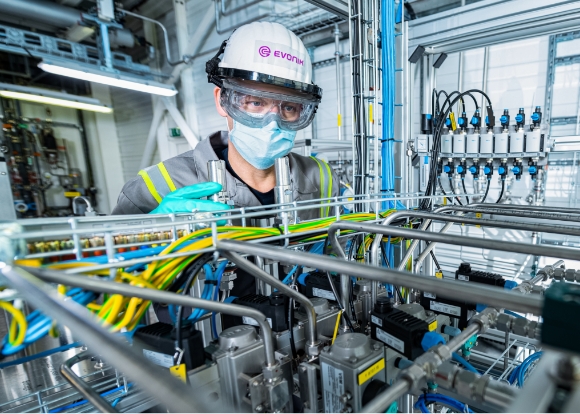
Focus on future technologies
At its Hanau location, Evonik built up lipid production in a matter of a few weeks.
© Evonik Industries AG

Fighting the pandemic
How Evonik Health Care realised the lipid project with astonishing speed.
©Evonik Industries AG
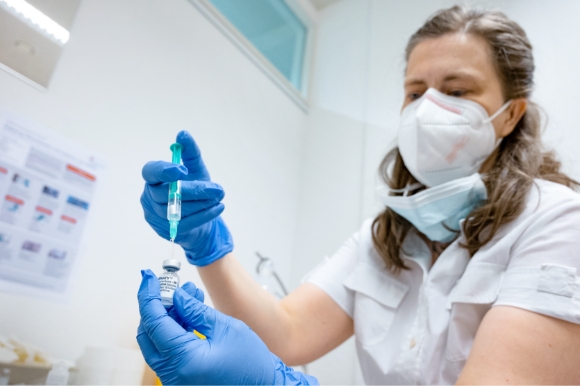
Vaccination campaign
With its company doctors and eight vaccination centres, Evonik supported the fight against the pandemic. © Evonik Industries AG
300 k
people live in Vivawest homes.
Vivawest
Vivawest develops residential areas holistically – including supporting the neighbourhood and networking the areas. ©Vivawest
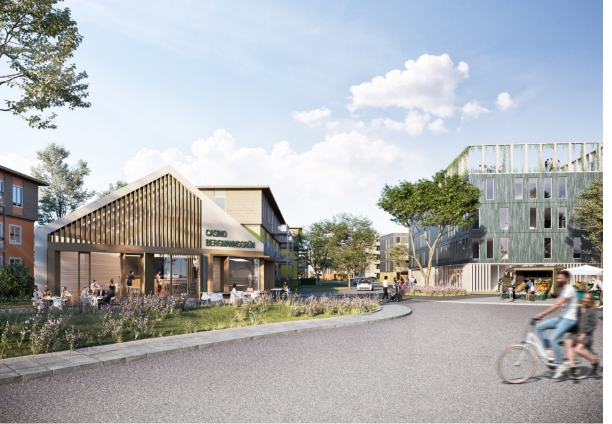
Bergmannsgrün project
In Dortmund, a new model neighbourhood for sustainable living will be built by 2027 for the international horticultural exhibition in 2027.
© Vivawest Wohnen GmbH
Vivawest GmbH: Coupling solidarity, profitability and climate action
Vivawest is amongst the leading residential companies in North Rhine-Westphalia. With its roots in building flats for miners, today Vivawest maintains nearly 120,000 flats in some 100 communes along the Rhine and Ruhr rivers. The company thus provides homes for approximately 300,000 people. Its stated objective is to couple economic and ecological efficiency with social responsibility. In doing so, Vivawest brings together traditional mining values like solidarity and a spirit of community with climate action and the objectives of its business operations.
In its climate protection strategy, Vivawest adopted the goal of making its entire housing stock climate-neutral by 2045. Achieving this is a great challenge, because flats have to be gradually renovated and upgraded in terms of energy efficiency, all while people continue to live in them. The improvements are thus being carried out step by step, in close coordination with the renters.
Measures include insulation of the facades, conversion of heating to heat pump technology and installation of photovoltaic units on roofs. This conversion requires major investments, not least because the costs for construction materials and tradecraft services have risen and will continue to rise.
In this regard, Vivawest strives to find a balance between future- and climate-friendly measures, profitability and affordable rents.
Moreover, the company also develops climate-friendly neighbourhoods along the Rhine and Ruhr rivers where new builds and energy renovation go hand in hand. The Bergmannsgrün (‘Miner’s Green’) development in Dortmund-Huckarde, where Vivawest is building new affordable housing with participation of the tenants, is one example of what such a model neighbourhood can look like. Additionally, several hundred flats are being modernised and upgraded in terms of energy efficiency. The portfolio of services is rounded out by offers catering to the residents’ daily needs: in future, for example, the neighbourhood will be home to not only modern residential buildings with lush greenery,
but also package stations, e-bike, e-scooter and car rental services, co-working spaces, shops and a kindergarten. The neighbourhood provides valuable insights into how climate action and living can work together in the future, and thus is perfectly in accordance with the longterm goals of Vivawest.
RSBG SE: a strong partner for the SME sector
RSBG is the holding company of the RAG-Stiftung and, as such, is a long-term partner to successful companies in the SME sector. It bundles several investment fields and holdings, including Advanced Manufacturing Solutions. For this it includes various companies from the semiconductor industry which, together, cover the entire process for structuring semiconductors, commonly referred to as microchips. The group develops and produces machines to expose as part of a unique process micro- and nanostructures – for example on wafers – which are necessary for further production steps for semiconductors. The disruptive technology continuously makes new applications possible in this field.
Semiconductors have become a pivotal point of digitalisation. By now, semiconductors are used in nearly every electronic device – from washing machines to self-driving vehicles. And the demand is accordingly great. The German government and the European Union are subsidising this industry segment to overcome bottlenecks and to reduce dependence on countries outside of Europe. This is also a matter of importance to RSBG, which aims to contribute to anchoring this key product in digitalisation in Germany and, to this end, to connect its production regionally. In addition to the production itself, the portfolio also includes corresponding services and software.
In order to push progress and develop the technology even further, cooperation with research in this field at universities such as Harvard and Stanford or with institutes such as Fraunhofer is also part of the approach taken by the shareholdings.
Via the strategic stakeholdings of the RAG-Stiftung, future-oriented topics and products like lipid production, sustainable construction and renovation and the production of microchips contribute to financing perpetual obligations. They thus also contribute to the foundation’s ability to continue to achieve its mission.
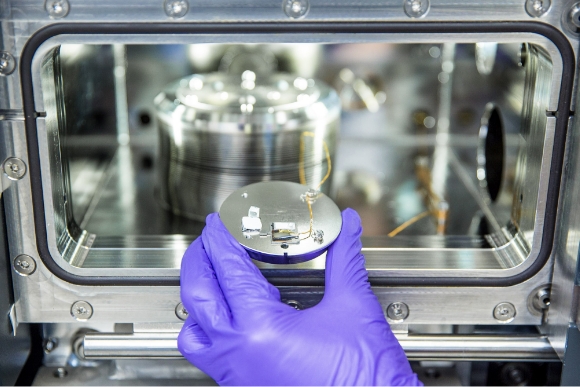
Disruptive technology
A holding of RSBG SE produces machines to expose wafers with micro- and nanostructures as part of a unique process.
©RSBG Advanced Manufacturing Technologies GmbH
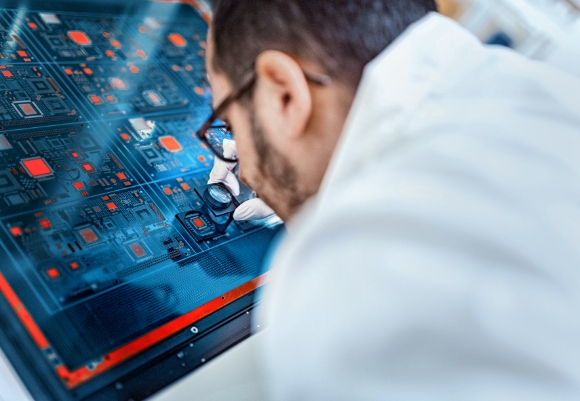
Eye on the value chain
In addition to production, the companies in the RSBG holding also offer services and software solutions. ©RSBG Advanced Manufacturing Technologies GmbH